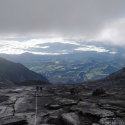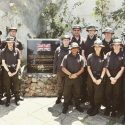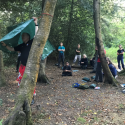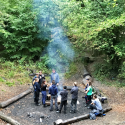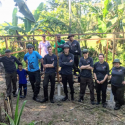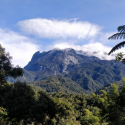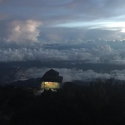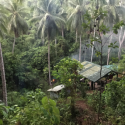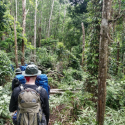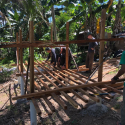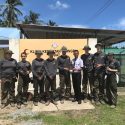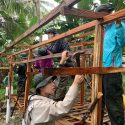Expedition Jungle Hart 2019, was the first expedition conducted by Herts and Bucks Wing ATC in over 10 years. It was a multistage expedition to the Malaysian state of Sabah on the island of Borneo. On expedition from the 18th October to 2nd November 2019, the Herts and Bucks contingent climbed Mount Kinabalu, trekked through the Jungle and undertook a community project.
The expedition consisted of six Cadet Forces Adult Volunteers and 12 cadets split into 2 teams, which were then further split into a total of four teams for the jungle phase. From a staff perspective, two of the expedition have prior extensive expedition experience, one with cadets and the other predominantly outside of the Corps. The other staff had a range of experience of personal overseas travel and cadet camp experience. The expedition was launched with the vision that it would provide significant training benefit to all staff as they gain experience of planning, organising and successfully running an expedition. This extends from the UK preparatory stage to the dynamic risk assessment and decision making whilst on expedition.
The first phase of the expedition saw Team 1, summit Mount Kinabalu. This involved a 2 day trek to from the Timpohon Gate at the entrance of Kinabalu National Park at 1,564m to the summit at 4,095m and back again. A long first day saw the team climb to their night stop at Laban Rata Resthouse at 3,273m. An alpine start followed as the team set off at 0230hrs in pursuit of reaching the summit for sunrise. The summit was reached, the team gathered for congratulations and photos as the sun rose from the East and the mountain cast a shadow across Kota Kinabalu. It was then for the team to make a quick descent back to the Timpohon Gate via Laban Rata Resthouse for breakfast. Meanwhile, based out of an outdoor centre near to the Tip of Borneo, Team 2 commenced a community project involving the construction of a chicken coop for a local family.
The second phase saw the whole expedition venture into the Jungle of Borneo. Split into 4 teams, the expedition spent 3 nights self sufficient in the jungle. Days were spent on the move, venturing through the jungle with the guides providing an invaluable source of knowledge to the teams. The days were also spent foraging for food which was then cooked by the team over a wood fire in the evening and again then at breakfast. The afternoon of the third day in the jungle was spent building the ultimate camp. The basics of hammocks and fire pit were setup and then the teams were given a creative license to build other camp accessories from bag racks to benches and tables.
The final expedition phase saw Team 1 build on the foundations laid by Team 2. The chicken coop was being built for a local family. From the extra money earned through the sale of meat and eggs the family would be able to send their two children to school and cover their water and electric bill each month. We were working in the second poorest area of Malaysia, with the neighbouring district being the poorest.
The expedition allowed for a short stopover in Bandar Seri Begawan where the expedition could unwind but also experience the former British Protectorate of Brunei. The expedition ventured to the Royal Regalia Museaun, the Oman Ali Suifuddin Mosque and the night food market.
Expedition Report
Training
The training programme for Jungle Hart 2019 spanned 7 months. For many of the participants, whilst they had undertaken elements of the Duke of Edinburgh Award, this was their first experience of an expedition outside of their local environment. Training commenced at the selection day, where a presentation was delivered to the participant outlining the fixtures of the expedition and the scope that participants could plan their own elements into the expedition. The participants then undertook teamwork and initiative exercises, an interview and an informal discussion, where participants could voice any concerns and ask questions away from the large group.
Whilst fitness training was left largely to the participants, the team undertook 38km walk along the Chiltern Hills section of the ridgeway National Trail. Whilst this was a physical challenge, it was also an opportunity for the participants to get to know each other in an informal environment whilst training for the expedition. The distance arguably excessive considering the short distance that would be covered in the Jungle or on Mount Kinabalu, it did however provide sufficient challenge and provide another differential between expedition members for selecting teams with complementary abilities.
The final training event prior to the expedition deploying to Borneo was a weekend long event. All participants met for a 10km walk to a local Scout campsite. The walk saw all participants carrying sufficient kit for the weekend as they got used to carrying their expedition rucksacks. The remainder of the weekend was spent with either lecture style briefings or practical training.
Lectures included jungle wildlife, Acute Mountain Sickness, Cultural awareness and Security briefs and finally the Incident Management Plan and Risk Management procedures. The practical sessions taught included river crossings, setting up a hammock and cooking on a wood fire. Participants were tested on their emergency procedures with a number of scenarios planned for the team to deal with from minor injuries to a full casualty evacuation. Having setup camp, the team cooked both their evening meal and breakfast on an open fire before turning in for the night under the Hertfordshire canopy.
Mount Kinablu
The ascent of Mount Kinablu was undertaken in two teams. Team 01 ascended the mountain on their first few days on expedition, Team 02 ascended on their last few days on expedition. The expedition achieved 94.45% summit success rate with only one member of the expedition unable, due to the effects of altitude, to make the summit.
Team 01 started their ascent with only 24 hours in country. It was a slow trudge up the hill as the team walked from rest station to rest station aiming to reach the Laban Rata Resthouse before nightfall. Starting at the Timpohon Gate the team ascended up the mountain in uninspiring overcast conditions. With less than an hour to walk before the Laban Rata Resthouse, we pushed above the cloud and were treated to a stunning inversion as the sun set into the cloud. The final 15 minutes we walked through the dark watching lightning storms in the thick cloud below us.
Dinner, a quick sleep and then at 0230hrs, we set off on our ascent. We slowly made our way up the mountain under the clear skies. Occasionally stopping to catch our breath and look up at the stars. We navigated up the ropes towards the summit plateau. As we stood on the summit plateau 100m below the summit the sun rose from the East casting a great shadow over the city of Kota Kinablu. After a few congratulations and plenty of pictures on the summit, Team 01 started their long descent off the mountain, arriving at the Timpohon Gate after dark.
Team 02 on the other hand enjoy the ascent of Mount Kinablu at the end of their expedition. Unlike team 01 that had jetlag, Team 02 had the compounded tiredness of a two-week expedition to contend with. Team 02 made an early start on their ascent to Laban Rata Resthouse. We were treated to stunning views of the mountain as they started their trek from the Timpohon Gate. Making our ascent, there was very little cloud in the sky.
Arriving a Laban Rata Resthouse at 1500hrs, the team refueled on their buffet dinner and enjoyed the sunset from our raised position halfway up the mountain. We turned in for the night early, learning from the experiences of Team 01, knowing that we had to make use of the early alpine start on our ascent of the mountain.
Rising early, we enjoyed our big breakfast and then set off up the mountain. Whilst we had to be at the Sayat Sayat Hut by 0530hrs to be allowed to tackle the final 400m ascent to the Summit Plateau and up the summit itself, we wanted to get their early to make it to the summit for sunrise. Team 02 made light work of the roped sections of the ascent and pushed for the summit. Arriving before sunrise, they took a seat and enjoyed the sunrise from the summit. Unfortunately, the clear skies from the previous day had not remained and the cloudy haze had descended onto the peak.
As the elation of reaching the summit subsided, the team started their descent down the mountain. With the end of the expedition in sight, the team made a swift descent down the mountain, only making a short pit stop at Laban Rata Resthouse for breakfast.
Jungle trek
Split into small teams of 4 or 5, the expedition began the jungle phase. Group kit, including a cooking equipment and a small amount of food was divided amongst the team members. Packed into our bags with tarpaulin, hammocks and a spare change of clothes, we set up into the dense jungle. The first day of trekking saw us venture deep along a jungle ridge before dropping to a purpose made jungle base camp that offered a semi-controlled environment for the teams first night in the jungle.
It was an eventful night, as a tropical storm raged, and the camp received a battering from the relentless rain. Initially each teams camp held up well to the weather, however as the volume of water increased, it began to pool in the top of one of the teams tarpaulins. Asleep below the tarpaulin, they were unaware until the tarpaulin split soaking those sleeping in their hammocks below. The team rescued what kit they could and made shelter then waited for the rain to ease before trying to re-establish their camp.
In the morning it was apparent that many teams had faced a similar problem, and whilst there were no other spectacular kit failures, much of the teams had wet kit to varying degrees. This mean that a change of plan was required. Rather than venture deeper into the jungle, we stayed our current jungle camp, reinforced where required and most importantly dried out all of our kit.
We took a number of machetes with us on expedition. The machetes were confiscated by Police on the streets of London and following prosecution rather than being sent to be destroyed we were allowed to take them to Borneo to be used, in the Jungle, as they were intended. Following our jungle trek, we gifted the machetes to our local guides so that they could use them and continue to teach visitors and show the magnificence of the Jungle.
Community Project
Due to the itinerary and structure of the expedition, the community project was undertaken by each team separately, with team 02 handing over to team 01. The community project was a significant ordeal for the teams. The heat and humidity presented a challenge to the participants, participants were limited to 20 minutes work before needing to switch out and take a rest to re-hydrate in the shade.
Team 02 began the construction of the chicken coop. They built the foundations, upright pillars and and the frame for the raised floor. Mixing concrete in the heat and humidity was challenging work. Many participants had not undertaken any construction or DIY projects outside of their school design and technology lessons. With a few pointers here and there the team improved their skills and before long they were experts with both a saw and a hammer.
Team 01 built on the progress made by Team 02, adding a wall structure, building joists for the pitched roof, adding mesh to the walls and floor before adding the corrugated tin roof and a door. Whilst less physically demanding than mixing concrete, they had to finish the project before they left. Team 01 had the honour of commissioning the chicken coop with a personalised painted door with the each participants name and an Air Cadet beret badge impressed into the wood.
Whilst within the community, Team 02 were very lucky to see the release of baby green turtles into the ocean. This event was primarily attended by locals and was in the interest of educating them about the preservation of wildlife in the area. Prior to this Team 02 assisted local students in a beach clean up that involved collecting all the rubbish that had washed ashore.
Team 01 also had the honour of visiting a local medical clinic where we were able to donate a number of unused filtration water bottles that can be used in the local community for the most vulnerable. The medical clinic primarily deals with minor ailments, offers inoculations and supports mothers post childbirth. It is hoped that the water bottles can be used to ensure that Mothers have clean water for themselves and their newborns. In addition to the filtration bottles, being the end of our expedition, we also gifted much of our unused first aid equipment to the clinic.
Conclusion
Ex Jungle Hart 2019 was a hugely successful expedition for Herts and Bucks Wing. Not only did it see the Wing return to leading expeditions after a 10-year hiatus, but it also achieved its aims in regards to the development of the Wings Cadets. The expedition safely tested their resilience in the face of adversity, their teamwork and practical experience of the outdoors.
From the initial training events through to the end of the expedition, the cadets have grown in confidence, competence and technical ability. The skills learnt have not been limited to walking and navigating or anything of an interpersonal nature, but also construction and improvisation. When parts of the expedition did not go to plan, the cadets adapted and overcame obstacles and as a result learnt from their experiences.
In addition to the benefits to the cadets, staff saw significant benefit as many of them undertook their first expedition and all staff participated in the planning and organisation of the venture. With a young staff this was almost certainly seen as an opportunity to build for the future.
Going forward, it is for Herts and Bucks Wing to be ambitious, mount more expeditions and provide more experiences to its Cadets.
The Ulysses Trust also wish to thank the generosity of the Royal Air Force Charitable Trust for supporting this expedition. www.rafct.com

